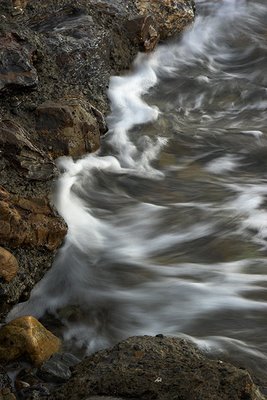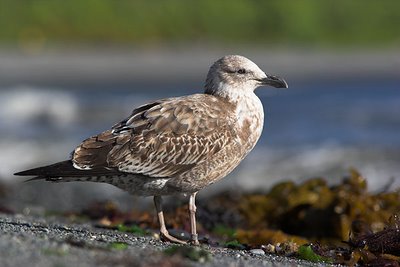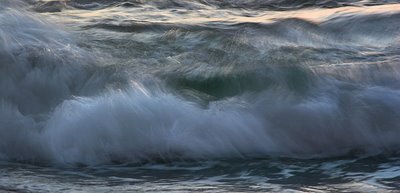 shine—the saws that helped fell much of our forest, including most of the giant kauri. Past a cabinet where introduced mammals posed, transfixed by the taxidermist’s art: a huge-antlered red stag frozen in mid charge; the ubiquitous possum; the exasperatingly iconic sheep. I moved on. Around the corner, I came across an alcove, carefully, respectfully illuminated. One wall simply listed extinct New Zealand birds, a litany of irredeemably vanished species. Next to it, a display contained relics of huia. Several beaks, artificially polished, trimmed with precious metals—a brooch, a pin for a fob chain. Things like that—I don’t remember, or didn’t pay attention. All I saw were the beaks. What have we done?
shine—the saws that helped fell much of our forest, including most of the giant kauri. Past a cabinet where introduced mammals posed, transfixed by the taxidermist’s art: a huge-antlered red stag frozen in mid charge; the ubiquitous possum; the exasperatingly iconic sheep. I moved on. Around the corner, I came across an alcove, carefully, respectfully illuminated. One wall simply listed extinct New Zealand birds, a litany of irredeemably vanished species. Next to it, a display contained relics of huia. Several beaks, artificially polished, trimmed with precious metals—a brooch, a pin for a fob chain. Things like that—I don’t remember, or didn’t pay attention. All I saw were the beaks. What have we done? Below the beaks, the curator had arranged a huia skull and a few bones, amber-yellow with age, on a dark board. Disarticulated, most of the skeleton missing. The bones of the feet still had tiny, curled claws; what remained of the bird lay in the position associated with an execution. I looked at it for a long time. I wanted to reach out, cup my hand over the small, fragile skull and let some of my own life flow into it. To tell it something—but what? That this would never happen again? That would be a lie. To ask forgiveness? Hypocrisy. That it would not be forgotten? What consolation is that?
The enormity of what we’ve done silenced me. All I wanted to do was touch that tiny skull, and I don’t know why.
In a small theatre adjoining the display, a film showed how people from disparate backgrounds live here in Aotearoa. An elderly woman, the matriarch of a sheep station in the southern South Island, described her relationship to the land:
“I’ve lived here so long,” she said, traces of significant schooling still evident in her voice, “that the land has become part of me.”
I wondered why she didn’t say she had become part of the land.
...
Back at the big house I sat on the deck, looking out across the harbour, Dirk and Miep meditating at my feet. A blackbacked gull  slid past on the air, tilting and rocking slightly, wings flexing in the wind. As it skimmed by, fast and close, it seemed I felt the air cushioned beneath me, the resilience under my own outstretched wings; I felt the slight pull of negative pressure on my back and the upper surface of of my arms as I surfed the sky. Soon after, three small birds flashed overhead, swift, streamlined, in a loose formation which they maintained when they suddenly veered East. They reminded me of small, flickering fish. Birds inhabit the air; fish the sea, lakes, and rivers. We, the superior species, creep on land, attached to its surface. Birds and fish live in an extra dimension and our only access to that life is through technology and imagination.
slid past on the air, tilting and rocking slightly, wings flexing in the wind. As it skimmed by, fast and close, it seemed I felt the air cushioned beneath me, the resilience under my own outstretched wings; I felt the slight pull of negative pressure on my back and the upper surface of of my arms as I surfed the sky. Soon after, three small birds flashed overhead, swift, streamlined, in a loose formation which they maintained when they suddenly veered East. They reminded me of small, flickering fish. Birds inhabit the air; fish the sea, lakes, and rivers. We, the superior species, creep on land, attached to its surface. Birds and fish live in an extra dimension and our only access to that life is through technology and imagination.
I have never seen an aeroplane jink and twist its way through the sky the way a tui chases a korimako through a garden; I’ll never see an aeroplane slip between the strands of a nine-wire fence like a magpie; never see an aeroplane alight with the deft touch of titipounamu clinging upside down to a twig. I’ve never seen any part of an aeroplane to match the engineering accomplishment of a feather.
On the other hand, I know of no bird that has ever lived that could lift a full grown human being into the sky, let alone over 500 at once; let alone transport all those lives thousands of kilometres. But why, as accomplishments, do these technological achievements seem so inferior to the flight of a sparrow?
technological achievements seem so inferior to the flight of a sparrow?
It's the same in that other three dimensional world. Encased in a wet suit, breathing bottled air and peering through a mask, I felt as if I were exploring another planet, perhaps a marvellous dream. At the Poor Knights Islands, years ago, I swam through an underwater arch as early morning sunlight poured down in long beams through deep blue water; floating a metre above the ocean floor I gazed at the open mouth of a small moray eel below me and watched rays glide past on undulating wings, a strange eye looking back as the great weird fish cruised past through the arch. I’ve dived at night, in black water, into a small, long tunnel where the world ceased to exist beyond the distinctly illuminated hemisphere of torchlight. I could have been in outer space. Without  bottled air, on a briefly held breath, I’ve dived down, twisted and tumbled like a seal, revelled in the pure joy of unconstrained movement in three dimensions. Yet any watching seal might have laughed, perhaps wet itself at my slow and graceless tumbling; the rays gliding past might have pitied the ridiculous hissing and bubbling form with its lumps and tubes and awkward aquabatics. If I hadn't been so full of delight—and hadn't needed the air—I'd have laughed too.
bottled air, on a briefly held breath, I’ve dived down, twisted and tumbled like a seal, revelled in the pure joy of unconstrained movement in three dimensions. Yet any watching seal might have laughed, perhaps wet itself at my slow and graceless tumbling; the rays gliding past might have pitied the ridiculous hissing and bubbling form with its lumps and tubes and awkward aquabatics. If I hadn't been so full of delight—and hadn't needed the air—I'd have laughed too.
When will our marvellous technology make machines to challenge the flight of birds, the shimmer of fish? More to the point—what, exactly, will we have achieved? And at what cost?
Meanwhile, we are spared humiliation because we believe birds cannot pity us; because we think fish are dumb.
Photos:
1. Evening shoreline, Eastbourne.
2. Juvenile blackbacked gull, karoro, Larus dominicanus dominicanus; Point Arthur, Eastbourne.
3. Edge of the sea, Eastbourne.
4. Evening sea, Point Arthur.
Photos and words © 2006 Pete McGregor
17 comments:
Lovely food for thought Pete. We think, are we therefore?
What have we done? and what are we doing? Destruction of the planet, I hate to think of what's in store for my grandchildren.
Pete - thank you. This post made me weep with despair AND joy....despair at what we have/are doing to the living beings in this beautiful ball in space that we live on, and joy at the eloquently put pictures you have drawn with your words. I've dived that spot in the Poor Knights also - it was breathtaking under there - and not just because of the bottle plugged into my mouth. The arch - what a thing to see and be near. My gratitude to you for the gifts you give and remind us of.
Lulu, that's a really lovely response and I truly appreciate it. Thankyou.
Tracy: Good thought. Thinking, it seems to me, can be both a problem and the key to solutions. But thinking's only one aspect of life. Guess you've got me doing it... ;^D
Duncan: Well, there's a lot I could say, but what immediately sprang to mind was that your mokopuna are really lucky to have a granddad like you — someone who values these things, delights in them, and shares them. And, refuses to grow up. Wonderful.
KSG: Glad you know first hand what it's like to be in that world. It's been a long time since I've dived, but the feeling's never left me and it's good to know it's shared :^D
What have we done. Yes. Some years ago here in California, while the war in the old Yugoslavia was raging, I heard an interview on the radio with a woman who had been in that war. At the end of most of her responses to the interviewer's questions she kept saying: There is no time not to love. There is no time, not, to love.
This is so beautiful, Pete. Interestingly, dpr and I went over to a museum yesterday (5/16) to drop off an old Great Horned Owl that we found dead last year (we had kept it in a freezer for this moment). We only had a moment to see one glass-cased exhibit in the museum while we waited for the curator to take our offering, it was full of birds from New Zealand.
What have we done? With recklessness and violent abandon, we imagine dominion is a license to take life merely to entertain and adorn ourselves. So many of us lack even a sliver of empathy. We have no antenna, and can not perceive the pain we cause the world. But I'd swear I have felt a bird look at me with pity. Or maybe I was looking in the mirror.
"I wondered why she didn’t say she had become part of the land."
Could it be because to say to be part of the land would imply you comprehend what the land is (what nature is, in other words), therefore you know you can be included in it? For me, it would almost sound arrogant.
At least, when she says the land has become part of her, she may not imply beyond her understanding, her perceptions of what the land is; and that, she includes it within herself, nothing more.
I'm sorry if it doesn't make much sense...
Do.
Thank you for this.
Melinda: Yes, I wish... it's hard to imagine a world like the one we have, if love was ubiquitous and reified in the truest, broad sense. Maybe if enough of us work on that...
Robin: That's an almost eerie synchronicity. I think your identification of that lack of empathy goes straight to the heart of the matter. How could we possibly do these things if there was any empathy there? But I watched a Hollywood movie recently, and during the usual brutal violence, the mostly adolescent audience laughed; the depiction of pain and cruelty seems ordinary and meaningless now. And that was humans doing it to humans. I wasn't encouraged about what that means for empathy towards anything not cute and adorable.
Do: To be fair, I suspect that's what she felt. However, for me, it would suggest I'm greater than the land — something I've never been able to do, and that sense of connection goes back to my childhood. I'll look forward to exploring this more over a Guinness, soon :^D
Patry: Thank you :^)
“…that the land has become part of me.”
Aren’t humans able to learn? Old age doesn’t seem to bring you some wisdom…
….a sentence of taking possession of something,that will take possession of you …sooner or later and still not realizing that you can not posses the earth and that the land will never be a part of you.
The earth doesn’t need you, …you need the earth!
So start thinking; …no matter what age, nationality or what ever you think you might be.
Anon: We may not be able to possess the earth, but in our attempts, we degrade it. But two things come to mind: first, that "we" does not mean everyone — old age can bring wisdom, but it's earned, not conferred as of right; moreover, it's earned, as you suggest, through thought and, I suggest, through compassion (closely related to the empathy Robin spoke of); second, that many of the problems arise from the "us/the earth" way of thinking. Somehow, that dualism seems inevitably destructive.
Thanks for reminding me of this; I wrote something about it ages ago and when I get back to Pohangina I'll hunt it out and see whether it's worth posting. :^)
Hi Pete,
...it is getting interesting.
Interested in reading your stories and the comments I think I should also write a comment.
Found something and hope, that I translated it right.
(..as you know, my english is not as good as I wish...)
Who does not respect the earth, she destroys, who does not respect all life as the own, becomes the murderer. Humans believe sometimes, he was raised to the owner, to the ruler. That is a mistake. It is only one part of the whole one. Its task is a guardian, a manager, not an exploiter. Humans have responsibility, not power. We think with each decision of the sieved coming generations. It is our task to ensure that humans after us, who find still unborn generations, a world, which is not worse than the ours - and hopefully better.
Before our white brothers came, in order to make civilized humans from us, we did not have prisons. For this reason we had also no criminals. Without a prison there cannot be criminals. We had neither locks nor keys, and therefore there were no thieves with us also. If someone were so poor that it did not possess a horse, a tent or no cover, then he did not get all this given. We were much too uncivilized, in order to put large value on personal possession. We only aimed at possession, in order to be able to pass it on. We did not know money, and therefore the value of humans was not measured after his wealth. We did not have in writing laid down laws, no attorneys and politicians, therefore we could would not amount to each other. It stood really badly around us, before the white ones came, and I cannot explain it to me, how we could get along without the fundamental things, which - as one says us - for a civilized society is so necessary.
John Fire Lame Deer
See you,
W.
Hey W, something I didn't mention in my response was how that dualism seems so characteristic of a particular culture — the currently dominant one. I'm speaking from limited knowledge, but it seems to me that many (most?) "uncivilized" cultures (the sneer quotes are intentional) don't make the distinction between the individual human and the earth/nature/whatever you want to call it. I've just got back to the valley, so I'll have a look tomorrow for what I jotted down a while ago; it seemed to put things in perspective for me.
See you tomorrow, W.
Great stuff, Pete.
A marvellous dream. Nice. That's how I feel every time I leave town. I don't have to go far to step into the forest, into a marvellous dream.
Thanks Brenda. I haven't seen it, yet, even the name seems otherworldly. The Boreal Forest. As if, when you walk into it, you walk into legend; step beyond what's known.
No words. Beautiful.
The photographs are stunning.
Thanks Mary! :^D
Post a Comment